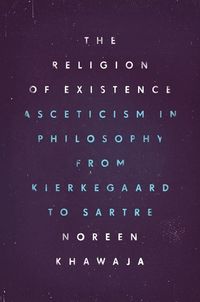
endast ny
Religion of existence - asceticism in philosophy from kierkegaard to sartre
TheReligion of Existence reopens an old debate on an important question: What was existentialism? At the heart of existential philosophy, Noreen Khawaja argues, is a story about secular thought experimenting with the traditions of European Protestantism. This book explores how a distinctly Protestant asceticism formed the basis for the chief existentialist ideal, personal authenticity, which is reflected in approaches ranging from Kierkegaard's religious theory of the self to Heidegger's phenomenology of everyday life to Sartre's global mission of atheistic humanism. Through these three philosophers, she argues, we observe how ascetic norms have shaped one of the twentieth century's most powerful ways of thinking about identity and difference the idea that the "true" self is not simply given but something that each of us is responsible for producing. Engaging with many central figures in modern European thought, this book will appeal to philosophers and historians of European philosophy, scholars of modern Christianity, and those working on problems at the intersection of religion and modernity.
Utgiven: 2016
ISBN: 9780226404516
Förlag: The university of chicago press
Format: Inbunden
Språk: Engelska
Sidor: 312 st
TheReligion of Existence reopens an old debate on an important question: What was existentialism? At the heart of existential philosophy, Noreen Khawaja argues, is a story about secular thought experimenting with the traditions of European Protestantism. This book explores how a distinctly Protestant asceticism formed the basis for the chief existentialist ideal, personal authenticity, which is reflected in approaches ranging from Kierkegaard's religious theory of the self to Heidegger's phenomenology of everyday life to Sartre's global mission of atheistic humanism. Through these three philosophers, she argues, we observe how ascetic norms have shaped one of the twentieth century's most powerful ways of thinking about identity and difference the idea that the "true" self is not simply given but something that each of us is responsible for producing. Engaging with many central figures in modern European thought, this book will appeal to philosophers and historians of European philosophy, scholars of modern Christianity, and those working on problems at the intersection of religion and modernity.
Ny bok
430 kr452 kr
5% studentrabatt med Studentapan
Begagnad bok (0 st)
Varje vecka tillkommer tusentals nya säljare. Bevaka boken så får du meddelande när den finns tillgänglig igen.



